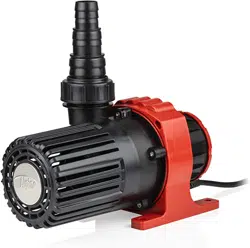Loading ...
Loading ...
Loading ...

5
•Only operate the pump when it has water running through it. Failure to do so will overheat the pump and cause it to fail, thus
voiding the warranty. DO NOT OPERATE DRY! If you are going to use your Eco-Twist™ pump “in-line” or “out of the water,” you
must prime the pump before turning it on. Priming a pump means to feed water into the tubing both in and out of the pump, to
help create a suction eect to draw the water from the source. Failure to do so may cause your pump to run dry, because of air in
the system- which could cause the pump to appear not to be working and will eventually burn out the pump altogether.
Remember, running an Eco-Twist™ pump dry voids the warranty!
•Be sure that the pre-lter cage is fully snapped shut (See gure 3.1). Failure to operate the pump without the pre-lter cage on
will allow large debris to enter the pump, causing the pump to fail and voiding the warranty. To protect your sh or other pond
wildlife from being sucked into the pump, it is highly recommended to not operate the pump without the pre-lter cage on.
•For models that come with an inline controller, please plug into your local power supply. If desired, please hang onto the wall
using the notch at the top of the controller. Use the plus and minus buttons to adjust water ow and power button to turn the
pump on or o.
PUMP INFORMATION
INSTALLATION
For more information about our company or products, please visit our website at www.alpine4u.com or call us (USA) 1-877-710-0162
•Do not wear loose clothing that may become entangled in the
impeller or other moving parts during installation.
•Keep clear of suction and discharge openings. DO NOT insert ngers
in pump with power connected.
•Do not pump hazardous materials or liquids, such as oil, saltwater or
organic solvents.
•Be sure no debris will block or restrict the pre-lter cage from water
entering.
(Figure 3.1)
Loading ...
Loading ...
Loading ...
